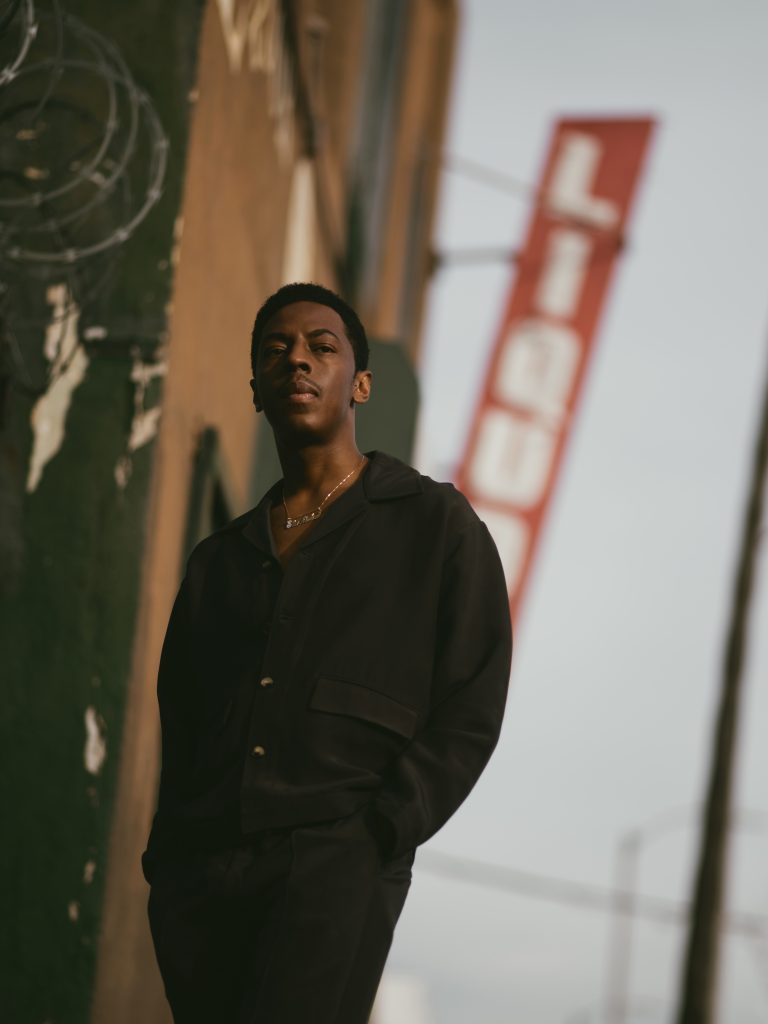Naeem
Startisha (37d03d)
Contact Sam McAllister about Naeem
Startisha introduces Naeem as a restlessly creative artist with an impressionistic, genre-bending album. As a complete work, Startisha exemplifies artistic daring and emotional intelligence while exploring new ideas and sounds, and philosophically excavating the artist’s histories. Startisha may be loaded with impressive collaborations and left-field sounds, but don’t get it twisted—this music comes straight from Naeem’s heart, representing the journey he’s taken to get to this point as well as what lies in the future for him.
Baltimore-hailing Naeem Juwan has spent much of the last decade stretching his creative legs in a variety of ways: he’s hit the road with artists ranging from the Avalanches and Bon Iver to Big Red Machine and Mouse on Mars, took part in a 37d03d residency in Berlin, and was selected as the music resident in 2019 for New York’s Pioneer Works space. Through it all, he’s been building the songs that make up Startisha, a record a half-decade in the making that featured Juwan pulling from creative circles all across the U.S. to craft a truly unique document of sound.
Studio work on Startisha started four years ago after Juwan linked up with producers Sam Green and Grave Goods in Philadelphia. “I was always working with people all over the world, and it became a bit stressful,” he explains. “I challenged myself to find new talent in Philadelphia and create with them. We started writing music not knowing we were working on anything—we were just building a rapport with each other.”
In Juwan’s words, Startisha presented an opportunity to move on from past work under different monikers, and strike out under his own name, with the experimentation in the music a parallel to the personalization of its subject matter. “It was really important for me to find people I could really count on to explore as many genres and do whatever I wanted to do—to walk into a studio with people who would let you try something new, or even try nothing at all. Every time I worked with them, I didn’t give any guidance at all about what the production should sound like. I just let them do what they do.”
After studio sessions in Philadelphia and New York, Juwan decamped to Minneapolis and holed up in Justin Vernon’s home studio, where Startisha continued to come together with contributions from Vernon, Ryan Olson (Gayngs, Polica), Swamp Dogg, Velvet Negroni, and Francis and the Lights. In addition to these impressive contributions, regular collaborators Amanda Blank and Micah James throw down on the clubby “Woo Woo Woo”—but Juwan stresses that the guest spots came together ” very organically. I originally didn’t want any features at all. Over time, meeting people and sharing the record with them, things just kind of happened.”
For Juwan, the challenge inherent in Startisha was to “write songs from a personal place, and to write love songs – both things I’ve never done before. The album kicks off with a gorgeous cover of the Silver Apples classic “You and I,” reinterpreted for today’s fraught times. “It sounds like a James Brown song to me, but if he sang it, he’d sing it as a slow song, and then I imagined myself crooning it,” he explains on how the cover came to fruition. “It’s an important song for people to hear right now, especially in terms of the ideas of self-care and the attention economy. The song’s about how we don’t have time for the little things, which feels really heavy and makes so much sense right now.” He continues to describe “Stone Harbor,” an album standout, as “a simple love song to my boyfriend, written in and name after the shore town he and his family spend their summers, Stone Harbor, NJ.”
Then there’s the bubbling electro-pop gem of a title track, which draws deep from Juwan’s personal well of experience. “I was thinking about this moment when I was a kid and we had a family get-together,” he remembers. “A friend of ours who lived in the neighborhood was named Startisha, and she came over when someone put on some Baltimore club music. She came through the living room and started freaking on me in front of all my aunts and uncles, and they were cheering her on.”
While this humorous moment of joy is captured in the song’s lyrics, “Startisha” introduces a reflective theme to the album that perfectly encapsulates where Juwan is at in this stage of his personal and professional existence. “I wanted to focus on that moment and turn it into a song about all the friends I’ve lost over the years,” he explains. “A lot of my peers have died, and I came to this realization that I’ve lost more peers than my other friends had. This person who I haven’t thought about in forever—I have no idea whether they’re dead or alive. I hope that, in this time that I’m here, I can still give people moments of joy, dancing, and laughter—the same way this friend did for me so long ago.”
On “Simulation,” the album’s first proper single, Juwan offers a kind of treatise of creative resistance on art and culture. “I had been reading a few books, such as Trickster Makes This World: Mischief, Myth, and Art, and they helped me solidify feelings I’ve had all of my life about surviving a society of institutions that presents fictions as fact, and often use these fictions to diminish my worth, or to convince me to join their gangs. So I wrote this song to remind myself, and hopefully everyone that hears it, that nothing is real, and our greatest defense in this life is our own creativity, and finding great faith in whatever sigils and icons we choose to guide us.”

